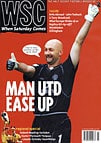 Former England international Tony Woodcock had two spells as a player with Cologne and settled in Germany aftr retiring. He has since worked as a coach and for a management company representing players as he told Andy Lyons
Former England international Tony Woodcock had two spells as a player with Cologne and settled in Germany aftr retiring. He has since worked as a coach and for a management company representing players as he told Andy Lyons
“I got a FIFA agent’s licence when I joined the company I now work for 18 months ago. We do everything connected with sport from TV production to internet coverage. My department is sports management, dealing with boxers and ice hockey players as well as footballers. When I first moved to Cologne from Forest [in 1979], a transfer to another country was a complicated business, like something from a James Bond story, with secret talks and flying here and there. I learned a lot about how things were organised and later in my career players would come to me for advice on things like moving clubs.
After I retired, I got into coaching with lower level clubs in Cologne. I also took at job with Leipzig, who had been one of the top east German clubs, when they were in the second division in 1994. I was advised against going but I was naive. The problem was the players expected to be told what to do all the time. I think the club wanted me to come in because I was an outsider and they thought I might shake things up. But this was only a few years after reunification and it would take a while for the players to adapt to being professionals in a Western sense.
Now we’re dealing mainly with players coming to Bundesliga clubs. They’ve got to be good to get signed up in the first place, and we cover everything to do with their move and their careers once they’ve arrived. The problems come when players are brought over just because they’re cheaper. Lower down the leagues in Germany you get agents who just take a player from one country, whether its Africa or eastern Europe, dump him with a club then forget about him. Obviously that’s not in the best interests of the clubs, who end up with sub-standard players, or the players, who end up stranded.
The coaching I received as player was completely different to what they get now. It’s a different world. In the old days you’d go to train on a muddy pitch then have a cup of tea afterwards. Today players go to work in a massive training complex, they train twice a day, they take all sort of physical tests, have their diet checked, the preparation is much more thorough.
Whether it’s always better, though, you couldn’t say. Good coaches can still produce results on lesser resources, and it depends on the players’ attitude too. Forest won the European Cup without ever being one of the big spending clubs of their day. A similar thing happened in Germany in the 1970s at Mönchengladbach, where there was a good coach [Hennes Weisweiler] who built up a team almost from scratch and won European trophies.
Soon it’s going to be compulsory for coaches in the UK to have a licence and that can only be a good thing. In Germany it takes four to five years to become a ‘qualified football teacher’. Everyone hates the course when they start. At first they might be telling you things that you feel you already know, but at least you think to yourself, ‘Well, OK, at least I’ve got that confirmed’. Then they show you new things that can give you a different perspective on the job. What that should tell any club is that someone who’s spent time learning has to be a better bet than an ex-player who’s not got any qualifications, even if he has played all over.
I could see myself coming back to England at some point if there was a role at a club that was prepared to plan for the long-term future. There’s too much short-termism in English football now. A club will give a manager £20 million, which he spends, and then if he doesn’t succeed, they sack him, then they give the next guy another £20 million, then sack him and so on and that money is just going out of the club. What they need are people who can put together a long term plan, who will find out about players before they sign them so they don’t end up with someone who’s carrying an injury and never plays. But it’s no good leaving that to a board of directors.”
From WSC 169 March 2001. What was happening this month